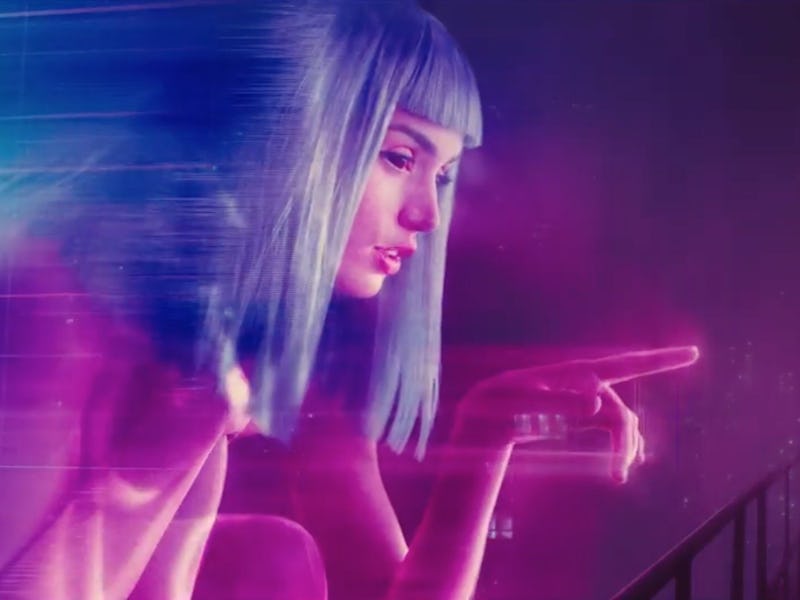You need to watch the most awe-inspiring sci-fi cyberpunk movie on HBO Max ASAP
Dune isn’t the first time Denis Villeneuve has tackled a major sci-fi property.

Denis Villeneuve loves a challenge. Across this past decade and a half, even before tackling Dune, the French-Canadian filmmaker had emerged as one of the most consistently impressive directors working within the Hollywood studio system.
Collaborating with renowned cinematographers like Roger Deakins, Bradford Young, and Greig Fraser, Villeneuve has delivered some of the most visually stunning, narratively ambitious, and strikingly moody blockbusters of the past 15 years.
With his latest outing, Dune, Villeneuve has ventured to adapt (half of) one of the most renowned but notoriously dense sci-fi stories ever. By many indications, he’s succeeded. But Dune isn’t the first time that Villeneuve’s dared to deliver a new take on an iconic sci-fi property.
As a matter of fact, 2017’s Blade Runner 2049 served as something of a conceptual dry run for his work on Dune, following up Ridley Scott’s endlessly influential and revered 1982 original with a massively scaled sequel. A 164-minute, slow-burn sci-fi detective noir, Blade Runner 2049 was (perhaps unsurprisingly) commercially unsuccessful in theaters. But its base of admirers has only grown in the years since.
Blade Runner 2049 is now streaming on HBO Max. Here’s why we recommend that you seek it out ASAP — perhaps after watching Villeneuve’s most recent space odyssey.
Across its staggering runtime, Blade Runner 2049 follows K (Ryan Gosling), a detective investigating the death of a pregnant woman in the outskirts of a dystopian, walled-off Los Angeles. Villeneuve’s story rarely shifts its focus away from K, dedicating its runtime to exploring the character’s beliefs and desires, all of which are gradually but surely thrown into disarray as he learns more throughout the course of his investigation.
As K, a replicant on the right side of the law, Gosling is suitably withholding and vulnerable — a closed-off loner who long ago gave up his dream of being, as one character says in the film, “a real boy.” When we meet K, he’s literally asleep at the wheel. But as Blade Runner 2049 plays out, K’s yearning for his emotions and experiences to be validated as “real” is palpable. In that sense, he’s 2049’s Roy Batty (Rutger Hauer) — if Batty’s fanatical efforts to come to terms with his existence were replaced with deep, existential uncertainty.
K has a relationship with Joi (a scene-stealing Ana de Armas), his holographic companion. Is the love between them real, or just the result of her being programmed to give him what he wants? To that end, are K’s memories truly his, or simply implants placed within him at the time of his creation? K is driven to ask these questions, thematically tying the sequel back to the original.
The lights of a dystopian Los Angeles reflect off the windows of K’s spinner.
In true Blade Runner fashion, 2049 doesn’t give K easy answers or the validation that he seeks. Instead, the film brings him face-to-face with characters like Sylvia Hoeks’ memorably vicious Luv, a Replicant who takes pride in being “the best” of her species, as well as an older Rick Deckard (a fittingly gruff but mesmerizing Harrison Ford), who long ago gave up asking the questions that plague K. Each character’s attitude works to further challenge K’s belief system.
Of course, one can’t talk about Blade Runner 2049 without mentioning Roger Deakins. One of Villeneuve’s frequent collaborators, Deakins brings visual artistry to Blade Runner 2049, filling frames with unforgettably gorgeous images.
Equipped with an impressive budget and sets designed to accommodate his majestic shooting style, Deakins is the MVP of Blade Runner 2049 — and the film ended up earning him his long-overdue first Academy Award for Best Cinematography. Turn Blade Runner 2049 on at literally any point, and you'll see why. It’s the most visually stunning sci-fi film of the 2010s, if not the most purely beautiful Hollywood movie of the 21st century so far.
In this house, we bow down before the icon that is Roger Deakins.
At its most basic, Blade Runner 2049 is a Philip Marlowe-esque detective story disguised as a stylish cyberpunk thriller, with a narrative as meandering, ruminative, and moody as that description suggests. But like 2016’s Arrival, it’s also a film that, over the course of its runtime, slowly reveals itself as an emotional and optimistic story about the importance of connection.
In that way, Blade Runner 2049 answers the questions raised by its predecessor by actively not answering them. It chooses to embrace ambiguity, and in doing so, reveals the poetry hidden within this sci-fi noir world’s haze of uncertainty. It’s about as beguiling and entrancing as a sci-fi film can be.
Blade Runner 2049 is available to stream now on HBO Max.
This article was originally published on